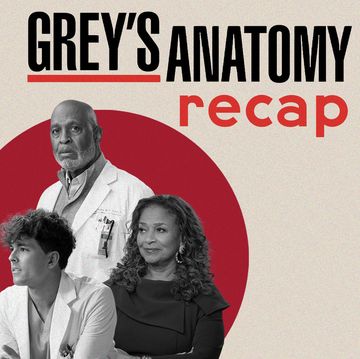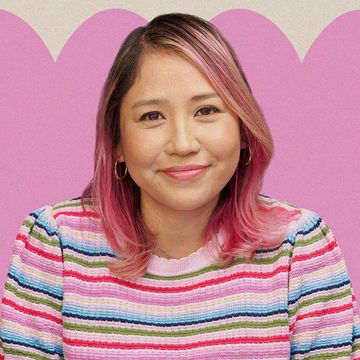Shondaland was heavy in the house at SeriesFest, an immersive annual five-day festival in Denver, Colorado, devoted to celebrating television and the brilliant minds who make it. Now in its 10th year, SeriesFest showed a lot of love to Shondaland, a longtime supporter of the conference, with a big honor for executive producer Betsy Beers, as well as a very cool mentorship award to up-and-coming director Shelby Blake Bartelstein, who’ll now get to visit the set of an undisclosed Shondaland show to shadow a director.
SeriesFest also hosted, among other panel discussions, a lively chat with members of the Grey’s Anatomy cast titled “Legacy in Television: Grey’s Anatomy,” which featured Grey’s faves James Pickens Jr., Kevin McKidd, Kim Raver, and Camilla Luddington alongside showrunner Meg Marinis. The panel was hosted by Glamour Senior West Coast Editor Jessica Radloff, and the Grey’s team talked about the show’s lasting impact, discussed some of the show’s most unforgettable moments, and shared personal anecdotes and memories from the set.
“My first day,” said Kim Raver, who joined in season six as Dr. Teddy Altman, “I remember it was kind of like being thrown into a Broadway musical. It’s very fast-paced. You’ve got the medical language, choreography with your hands, interpersonal dialogue. … It’s this incredible whirlwind. Your brain has to work at a very high level. And if you don’t know what you’re doing, you have BokHee,” she said, referring to BokHee An, the real-life scrub nurse turned supporting character on Grey’s, whose name prompted applause and cheers from the audience.
As intense as working on Grey’s can be, a theme that came up again and again was how the set is very much like a family atmosphere — a place where its hardworking cast feels welcomed and given opportunities for growth, which can be rare in Hollywood. “When I was a British actor,” said Kevin McKidd, who came to Grey’s after appearing in British films and series, including Trainspotting and the BBC drama The Virgin Queen, “I was this Scottish working-class actor, and I felt a kind of glass ceiling in my career, like I would never rise above it. But at Shondaland, the support they’ve shown — James Pickens was so kind to me. And being able to shadow Tom Verica and a bunch of other people, it’s really a testament to how internally they’re about elevating people, and things have happened I’d never dreamed of.” McKidd has since gone on to direct more than 40 episodes of Grey’s Anatomy.
Shondaland, they said, has also been particularly supportive of family off-screen, thereby creating an environment inherently beneficial for working women. Raver mentioned how, on previous sets, she had to hide her pregnancy and appear to be “one of the guys,” whereas at Grey’s, “it’s just great to see an environment that’s incredibly supportive of women, where we can be mothers and also can be badass.” Luddington echoed the sentiment: “I remember calling Shonda and telling her I was pregnant,” she said. “I had thrown up on set and was like, ‘Oh, God, everyone’s going to think I was hungover.’ I was very, very nervous. I called Shonda, and the first thing she said was ‘We love babies!’ Everyone is just so incredibly supportive of women. I was like, ‘Where am I? This is a dream!’”
The humanness, compassion, and support given off-screen on Grey’s is, the cast said, a big reason why the show is so successful: Assured that they’re working in a safe space, they can give all they’ve got to the show’s writing and storylines, which have been some of the most powerful to ever air on TV. Though Marinis wasn’t yet showrunner, she talked about how mind-blowing it was to see a story like “Freedom” — the jaw-dropping season four finale that had a boy jump into cement on a dare — air on television. Yet by far, the most lauded was season 15’s powerful “Silent All These Years” episode about domestic abuse and sexual assault, which included the revelation that Jo was the product of a rape. “I’m really proud of that episode,” Luddington told the audience to applause. The episode, which included a PSA from Ellen Pompeo, was so impactful, it led to a 1,000-percent increase in engagements with the Twitter account of the Rape, Abuse & Incest National Network (RAINN) the day after it aired. That kind of seismic potency, the ability to provoke important conversations about health care and the way it affects every person and veritably every part of our lives, is what the show is all about, said Pickens.
“I think the show helps us to understand what storytelling is really about,” says Pickens, who’s been on Grey’s as Dr. Webber since the very first episode aired on March 27, 2005. “I think Shonda was amazing in her foresight in determining what audiences would be able to digest moving forward. The show was so diverse that it changed the way casting looked, and it tells a wonderful story of these heroic people in this high-pressure job that says, ‘At the end of the day, these people are still human.’ It upset the status quo of how you watch television.”
Check out Shondaland.com for more about SeriesFest, and catch the 20th season of Grey’s Anatomy on Thursdays on ABC, or stream episodes on Hulu.
Malcolm Venable is a Senior Staff Writer at Shondaland. Follow him on Twitter @malcolmvenable.
Get Shondaland directly in your inbox: SUBSCRIBE TODAY












